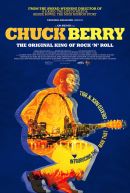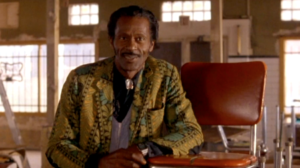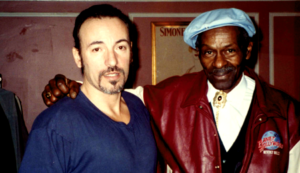 On May 21st, 1955, a 29-year-old songwriter, singer, and guitarist had his first major recording session at Chess Records in Chicago. Among the tunes that were cut then was “Maybellene,” which became a breakthrough hit for the artist, none other than Chuck Berry. Arguably, with that one song, guitar-oriented rock ‘n’ roll was born. Now, in the new film, Chuck Berry—The Original King of Rock and Roll, directed by Jon Brewer, Berry’s incredible legacy is explored in depth.
On May 21st, 1955, a 29-year-old songwriter, singer, and guitarist had his first major recording session at Chess Records in Chicago. Among the tunes that were cut then was “Maybellene,” which became a breakthrough hit for the artist, none other than Chuck Berry. Arguably, with that one song, guitar-oriented rock ‘n’ roll was born. Now, in the new film, Chuck Berry—The Original King of Rock and Roll, directed by Jon Brewer, Berry’s incredible legacy is explored in depth.
As Brewer was already a huge fan, he sought Berry’s relatives, as the legendary rock ‘n’ roller had passed in 2017 at age 90. “I got through to the family and talked to his widow, who was very charming,” Brewer said. “She had never done an interview before because [Berry] wouldn’t let her do it. Then, we built the story. When a man is dead, you have to create the story and find it within actions he has done and did.”

Even though Brewer gained access to people in Berry’s world, he realized that covering the entire Berry story would have been overwhelming for one documentary project. “You need three long feature films to do the story,” Brewer speculated of any comprehensive Berry project; Brewer’s film ran 103 minutes and was created for British firm Cardinal Releasing. “We were trying to get the ‘auteur’ claim of Chuck. It was extraordinary what was revealed—he influenced so many of my friends and many musicians and bands. That can never be denied.”
While many fans recognize the energetic Berry, gliding across the stage with his signature duck walk, playing his signature Gibson guitar, and singing, most might not be aware that Berry was a consummate songwriter. “He was a great poet, there’s no question about that,” Brewer claimed. “He wrote carefully and very good lyrics. Chuck was basically turned onto the fact that he had to write stories, and the stories had a base around the younger generation. He wrote songs about what was happening.”
The rock ‘n’ roll explosion of the mid-1950s was largely attributed to the enthusiasm of teenagers who came of age in post-war America. “He created the teenager,” Brewer stated of Berry. “If you think back on it, it was cars and soda parlors and hanging out in what was then the ‘hood. It was always these wonderful stories that he told. That went down very well—a lot of kids related to his lyrics.”

Unquestionably, Berry’s prominent guitar playing was essential in the formation of the new music, which inevitably led to the emergence of countless guitar heroes to come, a group of whom are featured in Chuck Berry—The Original King of Rock and Roll. “He was quite aggressive with his guitar,” described Brewer. “It was almost like a percussion instrument, the way he played it. It came over in a different way than a normal guitar player. It wasn’t the licks—there was some sort of kick in it that made you move. He had that tremendous get up and move accompaniment with the guitar.”
By all accounts, Brewer’s film included, Berry was a complicated person. Because his father was closely involved in the church, Berry initially put an N at the end of his name—Chuck Berryn—as he did not want his father to be associated with the ‘Devil’s Music.’ Additionally, Berry, an avid touring musician, maintained different personas in public and privately, at home. “When he walked out of the door of his house, he was Chuck Berry; in his house, he was Charles Berry,” Brewer revealed. “When he became Chuck, you have two different people there. If you try to tie them together, it’s impossible. Whatever goes out there stays on the road. When he came back in, he couldn’t have been a more loving man.”

Critical to the success of Chuck Berry—The Original King of Rock and Roll was the inclusion of Berry’s widow, Themetta ‘Toddy’ Suggs. “I think she was very sincere,” Brewer explained. “It’s very difficult making a documentary when you are interviewing the wife of the subject matter—they don’t know what they are supposed to say. At the end of the day, you’ve got to ask questions that lead to them explaining what they were all about.”
Purportedly, Berry was a very clever, smart businessman in his dealings with concert promoters in their various territories across the United States. “’Put the money in the guitar case, and I’ll go on stage,’” Brewer relayed what Berry would mandate on the site of his concerts. “The promoter had to pay it; otherwise, he didn’t go on. It wasn’t unreasonable—promoters were ripping off black artists. That’s how he always got paid. If it was in the contract, that’s what had to happen. If they didn’t supply the musicians that he wanted, there was a fine.”
In addition to Berry’s showmanship and groundbreaking guitar playing, he wrote lyrics that he knew he would be singing himself, all oriented towards a necessary cultural goal. “He was very articulate in the way he sung; he got that from Nat King Cole,” said Brewer. “He over-pronounced—that enabled him to sound white, and he knew it. In those days, radio didn’t play black artists; you had to be played by the white stations. People thought he was white, and they played the records. That was a very well-known situation, and that crossed over into white radio, which broke him.”

Lastly, Brewer suggested that Berry’s simplicity was key to his successes. “He created the three-chord wonder,” Brewer detailed of Berry’s horde of hit singles. “The Rolling Stones made a fortune on three chords—it was simplicity, from start to finish. Because of what Berry did, I believe he was the king of rock ‘n’ roll. He wrote the song, played the song, sung the song. That was rock ‘n’ roll.”
With a November 6, 2020 release, the DVD and Blu-ray for this film can be pre-ordered at: https://www.amazon.com/Berry-Chuck-Original-King-Blu-ray/dp/B083VQYQYF/.





